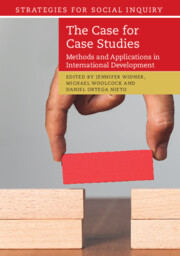Book contents
- The Case for Case Studies
- Strategies for Social Inquiry
- The Case for Case Studies
- Copyright page
- Contents
- Figures
- Tables
- Boxes
- Contributors
- Preface and Acknowledgments
- 1 Using Case Studies to Enhance the Quality of Explanation and Implementation
- Part I Internal and External Validity Issues in Case Study Research
- Part II Ensuring High-Quality Case Studies
- Part III Putting Case Studies to Work: Applications to Development Practice
- Index
Index
Published online by Cambridge University Press: 05 May 2022
- The Case for Case Studies
- Strategies for Social Inquiry
- The Case for Case Studies
- Copyright page
- Contents
- Figures
- Tables
- Boxes
- Contributors
- Preface and Acknowledgments
- 1 Using Case Studies to Enhance the Quality of Explanation and Implementation
- Part I Internal and External Validity Issues in Case Study Research
- Part II Ensuring High-Quality Case Studies
- Part III Putting Case Studies to Work: Applications to Development Practice
- Index
Summary
- Type
- Chapter
- Information
- The Case for Case StudiesMethods and Applications in International Development, pp. 304 - 312Publisher: Cambridge University PressPrint publication year: 2022
- Creative Commons
- This content is Open Access and distributed under the terms of the Creative Commons Attribution licence CC-BY 3.0 https://creativecommons.org/cclicenses/



